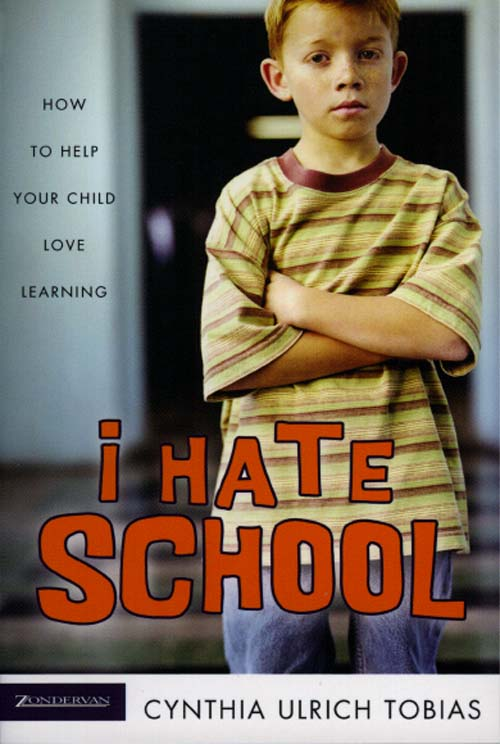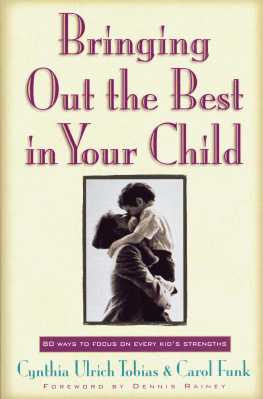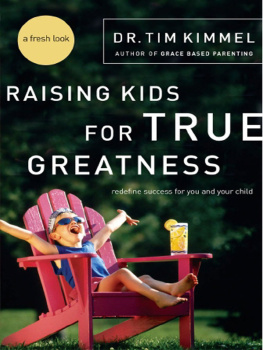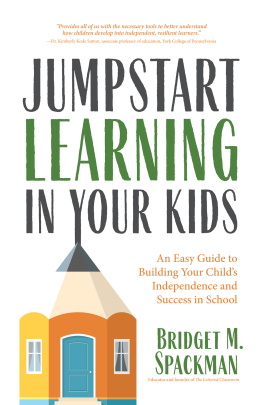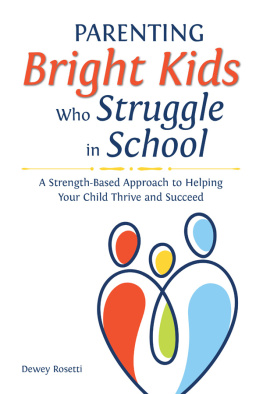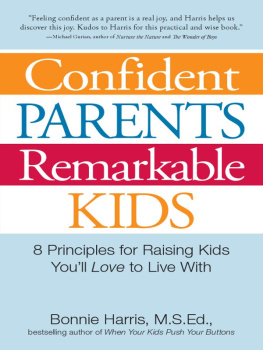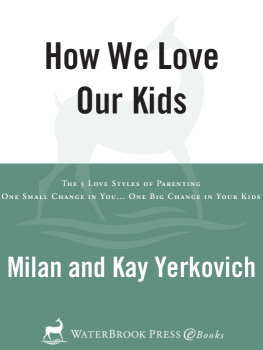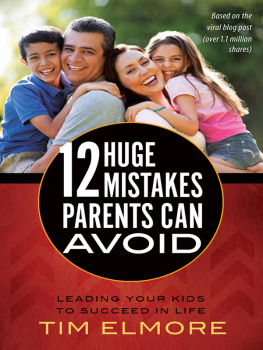Cynthia Ulrich Tobias - Every Child Can Succeed
Here you can read online Cynthia Ulrich Tobias - Every Child Can Succeed full text of the book (entire story) in english for free. Download pdf and epub, get meaning, cover and reviews about this ebook. year: 2012, publisher: Focus on the Family, genre: Children. Description of the work, (preface) as well as reviews are available. Best literature library LitArk.com created for fans of good reading and offers a wide selection of genres:
Romance novel
Science fiction
Adventure
Detective
Science
History
Home and family
Prose
Art
Politics
Computer
Non-fiction
Religion
Business
Children
Humor
Choose a favorite category and find really read worthwhile books. Enjoy immersion in the world of imagination, feel the emotions of the characters or learn something new for yourself, make an fascinating discovery.

- Book:Every Child Can Succeed
- Author:
- Publisher:Focus on the Family
- Genre:
- Year:2012
- Rating:5 / 5
- Favourites:Add to favourites
- Your mark:
- 100
- 1
- 2
- 3
- 4
- 5
Every Child Can Succeed: summary, description and annotation
We offer to read an annotation, description, summary or preface (depends on what the author of the book "Every Child Can Succeed" wrote himself). If you haven't found the necessary information about the book — write in the comments, we will try to find it.
Every Child Can Succeed — read online for free the complete book (whole text) full work
Below is the text of the book, divided by pages. System saving the place of the last page read, allows you to conveniently read the book "Every Child Can Succeed" online for free, without having to search again every time where you left off. Put a bookmark, and you can go to the page where you finished reading at any time.
Font size:
Interval:
Bookmark:
I would like to gratefully acknowledge my treasured friends and colleagues Carol Funk and Kathy Koch, for invaluable advice and critique; my secretary and dear friend Darlene Fleutsch, for her dedication and zeal; and Gwen Ellis, my first editor, for taking my talent and inspiring me to become a writer.
Here are some of my favorite and most trusted resources for learning more about learning styles.
Armstrong, Thomas. The Myth of the A.D.D. Child: 50 Ways to Improve Your Childs Behavior and Attention Span Without Drugs, Labels, or Coercion. New York: Dutton Books, 1995.
A former special education teacher, Dr. Armstrong provides 50 practical, positive ways to help the ADD child. His heartfelt and well-researched position is that ADD doesnt exist and that the children who experience behavior and attention problems are healthy human beings with a different style of thinking and learning.
_________________. 7 Kinds of Smart. New York: Penguin Books, 1993.
Using Howard Gardners model of Multiple Intelligences, Armstrong provides easily understood descriptions of the seven intelligences, as well as a list of 25 ways to help your child develop each one.
Barbe, Walter B. Growing Up Learning. Washington, D.C.: Acropolis Books, 1985.
Although this book is currently out of print, youll find your trip to the library to read it well worthwhile. The former editor of Highlights Magazine shares a wealth of information about auditory, visual, and kinesthetic modalities. Youll find age-appropriate checklists and dozens of suggestions for helping your child learn in many different ways.
Breggin, Peter R., and Ginger Ross Breggin. The War Against Children: How the Drugs, Programs, and Theories of the Psychiatric Establishment Are Threatening Americas Children with a Medical Cure for Violence. New York: St. Martins Press, 1994.
Dr. Breggin is a psychiatrist who has taken a stand against the use of medication for social control of children and their behaviors. He and his wife have written this compelling book, providing a host of alternative measures for fulfilling the genuine and often inconvenient needs of children.
Butler, Kathleen. Its All in Your Mind: A Students Guide to Learning Styles. Columbia, Conn.: The Learners Dimension, 1988.
Using Anthony Gregorcs model of learning styles, Dr. Butler has written a workbook designed to be used with teenagers who want to identify and learn to use their learning styles to be better students.
Chess, Stella, and Alexander Thomas. Know Your Child. New York: Basic Books, 1987.
This volume is packed with evidence (including longitudinal research studies) to prove that children have their own, unique temperaments from the beginning to the end of life. The authors goodness of fit theory has some practical applications to successful parenting.
Gregorc, Anthony F. An Adults Guide to Style. Columbia, Conn.: Gregorc Associates, l982.
This is the definitive volume for identifying and understanding Gregorcs model of learning styles. Packed with definitions and examples, this book is an invaluable reference for serious study.
Keirsey, David, and Marilyn Bates. Please Understand Me: Character and Temperament Types. Del Mar, Calif.: Prometheus, Nemesis, l978.
This book provides a fascinating look at personality types and temperaments. Youll discover how your temperament affects your success in relationships, careers, and life in general.
Kroeger, Otto, and Janet M. Thuesen. Type Talk. New York: Delacorte Press, 1988.
This is a fun, easy-to-read guide to the Myers-Briggs version of Carl Jungs personality types. Loaded with anecdotes, this book is one youll find yourself loaning to your friends.
Rusch, Shari Lyn. Stumbling Blocks to Stepping Stones. Seattle: Arc Press, 1991.
This book relates the touching, true story of a little girl growing up with multiple learning disabilities who struggled to become successful in spite of a school system that gave little or no help. Full of hope as well as specific suggestions for other children who may be suffering, this book is a valuable resource for parents and teachers.
Swindoll, Charles R. You and Your Child: A Biblical Guide for Nurturing Confident Children from Infancy to Independence. Nashville: Thomas Nelson Publishers, 1990.
Charles Swindoll has written a compelling and eye-opening book for parents who want to instill lasting moral and spiritual values in their children. Using a scriptural perspective, Dr. Swindoll presents a powerful argument in favor of each childs individuality and value.
Tobias, Cynthia Ulrich. The Way They Learn: How to Discover and Teach to Your Childs Strengths. Colorado Springs, Colo.: Focus on the Family Publishing, 1994.
This entertaining and practical book should be required reading for any parent or teacher who truly wants to help their children succeed. These concepts are powerful tools for bringing out the best in a child.
_________________. The Way We Work: A Practical Approach for Dealing with People on the Job. Colorado Springs, Colo.: Focus on the Family Publishing, 1995.
This is an enlightening and easy-to-read resource for developing more efficient communication with coworkers. It provides a powerful plan for transforming your on-the-job relationships.
Tobias, Cynthia Ulrich, with Nick Walker. Whos Gonna Make Me? Effective Strategies for Dealing with the Strong-Willed Child. (45-minute video) Seattle: Chuck Snyder and Associates, 1992.
This video presents practical, hands-on strategies for bringing out the best in your strong-willed, Concrete Random child. This is one youll definitely loan to your friends.
Favorite Childrens Books
Brown, M.K. Sallys Room. New York: Scholastic, Inc., 1992.
Here is an ageless story for any parent who has fought repeated battles over a messy room.
Hazen, Barbara Shook. Even If I Did Something Awful. New York: Aladdin, 1992.
This is a story of unconditional love without compromising parental authority. Good for all ages!
Henkes, Kevin. Chesters Way. New York: Puffin Books, 1988.
This delightful story shows children how their learning style differences can help them appreciate others for their strengths.
Lester, Helen. Tacky the Penguin. Boston: Houghton Mifflin, 1988.
Here is a wonderful story for any child or adult who needs to be reminded that being an individual definitely has its advantages over simply running with the pack.
For more information or to obtain a speaker, please contact:
Apple St., LLC
Post Office Box 1450
Sumner, WA 98390
Phone: (253) 848-4446
E-mail: applestvt@aol.com
Web site: www.AppleSt.com
More on Learning Styles from Cynthia Ulrich Tobias!
The Way They Learn
No two kids are alikenot even identical twins. So its really no surprise that many children struggle with rigidly structured classrooms. Unlock their potential by using each childs natural strengths and interests to enhance his or her education. By putting to work the practical approaches found in these pages, youll eliminate much of the frustration that comes from a mismatch in learning styles (yours and theirs), and youll stimulate their learning in ways you never imagined.
The Way We Work
Pristine offices, cluttered desktops, and everything in between every employee is unique, so a one-size-fits-all approach to doing the job doesnt get the job done. Release your full potential by understanding the way they work. Once you identify the learning styles of the people you work with, youll better know how to pose questions, assign tasks, and avoid buttons that shouldnt be pushed. Youll also increase efficiency, boost morale, and improve the likeability of some of your companys finest employees including yourself.
Next pageFont size:
Interval:
Bookmark:
Similar books «Every Child Can Succeed»
Look at similar books to Every Child Can Succeed. We have selected literature similar in name and meaning in the hope of providing readers with more options to find new, interesting, not yet read works.
Discussion, reviews of the book Every Child Can Succeed and just readers' own opinions. Leave your comments, write what you think about the work, its meaning or the main characters. Specify what exactly you liked and what you didn't like, and why you think so.

